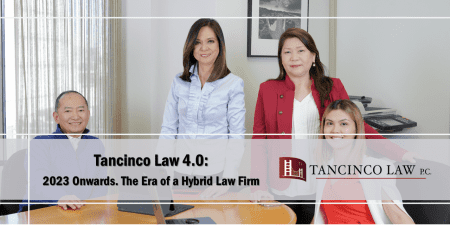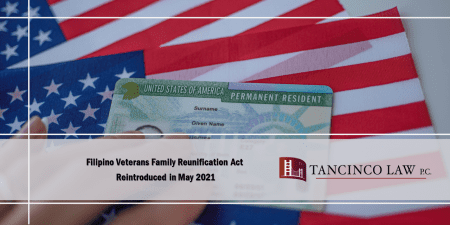Typewriters, copier machines, telephone landlines and stack of legal pads..these were the initial office tools that we had when Tancinco Law opened in May 1992. The office was located at the center of downtown San Francisco on Fifth and Market.
In 1992, Tancinco Law was founded by two alumni of the University of the Philippines College of Law, spouses Rey and Lourdes Tancinco. Equipped with a law degree, Philippine and California bar licenses, they started their own practice to provide legal services to their fellow immigrants in their adopted land.
F.B.I. were the initial areas of practice: Family Law, Business Law and Immigration. As the years passed and as the client base increased, it found itself practicing 80% immigration law with clients mainly from the first generation of Filipino immigrants.
The First Decade: 1992-2002 “Baby Steps” Years
Just like a toddler learning to walk, the first 10 years were marked with baby steps to building clientele. Family and close friends were indispensable to building the practice. In fact, the first few attorneys and staff were close friends. It was during this first decade that Attorney Lourdes Tancinco (Atty Lou) engaged voluntarily in community service by providing pro bono legal services to Filipino World War II veterans who were new immigrants then arriving under the IMMACT90. Through the free legal clinic, thousands of elderly veterans were able to reunite with their spouses and other family members.A 501(c)(3) organization was co-founded by Attorney Lou, the San Francisco Veterans Equity Center (SFVEC).
Tancinco Law’s immigration practice took on general immigration cases such as family and employment based visas. Highlights of the practice was the increase of the healthcare workers being petitioned by hospitals and health care agencies. During this decade the H1A visas, specifically created for registered nurses, were issued to many Filipino nurses assisted by the firm. The firm also assisted with getting visas for managers and employees of businesses in the Philippines extending their operations in the United States. In 1997, a legislation was passed resulting in the major overhaul of the Immigration & Nationality Act making it more difficult for those with prior fraud immigration violations and criminal cases to legalize their stay in the United States.
While no legalization law was enacted, Section 245i was enacted giving opportunity for those in unlawful presence to adjust status as long as they have approved petitions filed before April 30, 2001. Thousands of Filipino clients took advantage of this legislation.
Second Decade: 2002-2012 “Expansion Years”
The second decade is about expansion. Physical locations of the Tancinco Law were established. First with the Manila office in 2007, Vallejo in 2008, Milpitas in 2012. With the physical offices in various locations Tancinco Law attorneys were able to reach more clients in close proximity to the office location.
With no new legislation affecting immigrants coupled with the 2008 Recession, the practice of law was somehow adversely affected. Nonetheless, the firm continued its immigration advocacy as Atty Lou continued to engage in educational campaigns through her newspaper columns published weekly in Philippine Daily Inquirer, Philippine News and Filipino Guardian. It was also during this second decade that Attorney Lou embarked on a non-traditional lawyering project, that of a Host and Producer of an Immigration TV show known as GMA’s Pusong Pinoy Sa Amerika. Pinoy Panawagan at TFC’s Balitang America was also launched where she appeared on TV answering viewers’ questions on immigration matters.
One of the historic moments during this decade was enactment into law of the Filipino Veterans Compensation Act of 2009. Atty Lou through the San Francisco Veterans Equity Center, and other community advocates actively lobbied for the passage of this Act which benefited thousands of Filipino veterans who fought during World War II.
The Third Decade 2012-2022 “Survival Years & the Birth of the New Normal”
With four physical locations in existence, a fifth location was established in 2015. The goal was to reach more clients in the Los Angeles area. The law firm became busy this era not because we had more clients availing of services but because we had more inquiries about consequences of Trump’s anti-immigrant policies. Restrictive deportation rules were enforced. The firm was able to assist clients in their removal cases and successfully got their green cards despite the lengthy wait.
This decade experienced the worst and unexpected crisis: the COVID-19 outbreak in the early months of 2020. The firm closed all of its 4 physical locations. Operations of Tancinco Law were done remotely. Attorneys and staff using technology were all working from home but efficiently reached out to clients and completed tasks more productively. The pandemic years gave way to the new normal, the hybrid law firm where the practice will continue to use technology to provide efficient service to its clientele.
The physical location of the office moved from the City of San Francisco CA to Burlingame CA (near SFO Airport about 20 minutes away from the City). Tancinco Law remains very accessible to existing and potential clients. On its website, clients may reach attorneys and schedule appointments. The phone number and email addresses are the same.
2023 will be the beginning of its 4th decade. No more typewriters and paper files. It is an operational hybrid firm that has adopted the new normal of being a paperless office, staff working remotely and communicating more efficiently using different platforms. Tancinco Law is moving forward and continuing its commitment to provide services to the immigrant community especially now that it has retooled using new and best digital technology.



